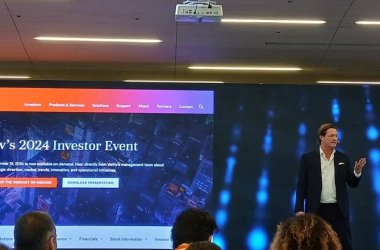CNME Editor Mark Forker sat down with Claire Maslen, Programme Director for Commerce and Payments, at the Mobile Ecosystem Forum, to find out more about the need for greater reliability when it comes to mobile payments, the rise of social commerce, why digital wallets need to become more intelligent – and the impact Central Bank Digital Currencies will have on the global financial ecosystem. 
Claire Maslen has enjoyed a distinguished career in mobile, payments and commerce, one which at this juncture has spanned over 30 years.
She has held executive roles at blue-chip technology and telecom behemoths such as Cisco and O2 (Telefónica UK).
More recently, she has worked for Consult Hyperion and Samsung.
She has also recently swapped the UK for the UAE, and has just been appointed as the new Programme Director for Commerce and Payments at Mobile Ecosystem Forum.
The Mobile Ecosystem Forum (MEF) is a global trade body that was established in 2000, and as the self-proclaimed voice of the mobile ecosystem, it focuses on cross-industry best practices, anti-fraud and monetisation.
CNME managed to secure an exclusive interview with Maslen in an effort to better determine what the future of mobile payments is going to look like, and there are few better qualified and positioned to give us a broader overview of the payments landscape.
Maslen kickstarted the conversation by outlining why she believes that the payments industry can take a lot of learning from the mobile sector, and also highlighted the need for telecom companies not to take their eye off the ball when it comes to infrastructure.
“I recently wrote a thought leadership piece that focused primarily on the importance of infrastructure and all the pipes and plumbing around the payments’ ecosystem, and that is something that we can’t forget, it is absolutely crucial. I believe that’s where the payments industry can take a lot of learning from the mobile industry. Payments are so intrinsic to all of us, and the differentiator is going to be around the availability of connectivity because payments are becoming more pervasive in everything that we do,” said Maslen.
She outlines how in the very near future she envisages a scenario where we can go through a train, or bus station without having to interact with anyone.
“Take for example, a potential ticketing scenario, we have made the move from paper tickets, to card-based tickets, and now we have mobile tickets, but it still relies on us interacting. If you think about the technology that is coming along, and as 5G expands, and we get into 6G and as things like ultra-wideband come along those are core mobile technology pieces, which will really facilitate seamless transactions. So, you could in the future quite easily walk in and out of a train station without having to interact at all,” said Maslen.
Maslen outlined her beliefs that the infrastructure required for the connectivity to facilitate payments seamlessly needs to be viewed as a critical utility, just like electricity and water, echoing the viewpoint of many people who believe access to the internet should be a basic human right.
“There’s no doubt that regulators have shed a light on how critical the infrastructure is recently. In the UK, we have seen outages of retail networks, and a couple of years ago, one of the major card scheme networks went down for an afternoon, now was that as a result of an implementation issue, or is it just the sheer scale of pushing everyone through to digital payments. The mobile payments movement has happened very quickly, but the infrastructure has to be part of our critical utilities like electricity and water, so if we are moving all payments to digital then the underlying infrastructure has to support it,” said Maslen.
The conversation then moved towards the role of digital wallets in our life, which has now become a staple part of our day-to-day experience, it has replaced the traditional physical wallet, but Maslen believes in its current format that it adds little to no value.
“At the moment, if you think about the digital wallets that we all use such as Apple Pay, Google Pay, and Samsung Pay, they are just your mobile device pretending to be a card, it’s not really adding much value to you. I believe that the real value will emerge when the wallets start to do some of that intelligence for you, such as pointing you in the right direction to use a particular card product at a particular merchant, or it might nudge you to highlight how some of your spending patterns that have changed. Undoubtedly, there is a massive potential with digital wallets that we are yet to tap into,” said Maslen.
AI is everywhere at the minute, and is transforming every single major industry vertical from manufacturing to healthcare.
Unsurprisingly, Maslen believes AI will be the critical component in making our digital wallets much more intelligent in the future, and believes a company like her former employers Samsung have a huge opportunity to tap into the huge opportunities that exist in the payments space.
“Samsung have launched a number of new products that have AI infused into them. If you look at Samsung as a case study, they’ve got the handsets, the hardware and the wallet, but they need to build out those relationships that sit in the wallet. They need to work with different banks and different retailers to really fill that wallet up. Samsung have their own store, and have their consumer electronic products, and their white goods, so you could easily envisage a future where you go into a retail store and purchase a TV and you get a warranty, but why would that warranty not be delivered straight to your wallet? In the future you should be able to go to your digital wallet as it will have all your credentials and all the information you need, because receipts and warranties are a pain point for consumers. I think some of these brands that have multiple touch points with consumers can really start to exploit that, and use the wallet with more intelligence sat in it,” said Maslen.
Maslen spent a huge part of her career with O2 (Telefónica UK), and knows the industry inside out. Many telecommunication providers have been lambasted in some quarters for a perceived lack of innovation.
However, as Maslen pointed out it is not as straight forward as that.
“There are a lot of complexities facing mobile operators. Ultimately, they are huge trading organisations that get criticised if they take their eye off the ball from a connectivity perspective, and if they don’t invest in innovation then they also get criticised, and they are all resource constrained, so there is always that tension. I know from my experience at O2 Telefónica UK that they tried on multiple occasions to create internal innovation hubs, they attempted to acquire companies that could deliver some of that innovation for them, so there’s always that tussle. However, in any innovation cycle the simple fact of the matter is that you can’t get away from that core enablement and core connectivity. They are core communications utilities, and they have to get that bit right before they do anything else,” stressed Maslen.
There has been a lot of discussion of late around Central Bank Digital Currency.
Maslen says that the bones of contention around it from a consumer perspective are valid, but said banks are increasing their focus on the new concept.
“From a digital currency perspective everyone talks about the crypto market, but what we are talking about here in relation to Central Bank Digital Currency is very different. These will be currencies that are linked and provided by the Central Banks in the different regions. When we think about how valid they are from a consumer perspective there is a whole debate about it. I would say that the obvious benefits for Central Bank Digital Currency is in the flow of money. It gives users the ability to move money really quickly, and there is that transparency in being able to see a transaction leave and pass through one Central Bank to the next. From a treasury and banking viewpoint consumers perhaps don’t have to worry too much about it just yet, but I think the banks are all focusing in on it because they see an opportunity around that speed of transaction, being able to move money quickly and probably quite cheaply too, so there will be an economic benefit for all the banks to be able to move money quickly,” said Maslen.
The final part of our conversation was on the rise of social commerce, which can have many different meanings and definitions, but as Maslen explained can provide great insight and visibility into the spending habits and behaviours of consumers.
“I think it’s always good to set a bit of context around a topic, and when it comes to social commerce and I think it’s always worth to look at it from a macro trend in terms of what people are doing and their behaviours. We know that millennials are very tribal, and they are very influenced by their groups and they form these tribes. They’ll take advice from a social influencer for example, so to me that’s the backdrop from a behavioural perspective. Social commerce is being able to interact through any of the social media platforms and be able to conduct a transaction. For example, I’m looking at a girl on TikTok, she’s doing a dance and she’s wearing a great pair of trainers, so I want to buy those trainers. That’s a classic click through where you go straight to the merchant and buy those trainers. That’s a social commerce transaction,” said Maslen.
However, Maslen highlighted how there are also seeing a huge increase in fraud in these types of social transactions, not necessarily through TikTok, but across all social media platforms.
She believes that marketplaces need to do more to verify merchants in order to reduce the volume of cybercrime when it comes to social commerce.
“One of the reasons for that is I can be whoever I want on the internet, nobody knows who I am, or what I am. I can be pretend to be someone, and I think in creating a fake account, and especially now when you think about the opportunities that exist around Deep Fakes. I don’t have a clue who I am interacting with on these platforms and that could impact me from a payment perspective, because I could quite innocently click to pay on a transaction that has been created using Deep Fake technology, and the transaction is fraudulent, so there are pitfalls. There are two potential answers to this problem, and one of them is the role of marketplaces, so if I enter into a marketplace as a seller and I am verified then that gives the consumer and buyer the confidence that they are dealing with a real entity. Secondly, if you look at your physical wallet now it probably has your personal information on them, so those wallets are actually as much about identity as they are about payments. So, in summary, I think digital wallets will play into social commerce transactions in the future in terms of being able to identify both sides of the transaction,” concluded Maslen.





